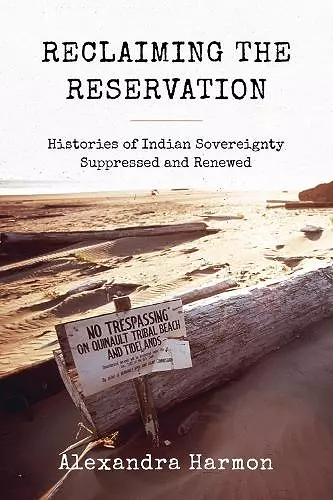Reclaiming the Reservation
Histories of Indian Sovereignty Suppressed and Renewed
Format:Hardback
Publisher:University of Washington Press
Published:26th Jul '19
Currently unavailable, and unfortunately no date known when it will be back
This hardback is available in another edition too:
- Paperback£27.99(9780295745855)

In the 1970s the Quinault and Suquamish, like dozens of Indigenous nations across the United States, asserted their sovereignty by applying their laws to everyone on their reservations. This included arresting non-Indians for minor offenses, and two of those arrests triggered federal litigation that had big implications for Indian tribes’ place in the American political system. Tribal governments had long sought to manage affairs in their territories, and their bid for all-inclusive reservation jurisdiction was an important, bold move, driven by deeply rooted local histories as well as pan-Indian activism. They believed federal law supported their case.
In a 1978 decision that reverberated across Indian country and beyond, the Supreme Court struck a blow to their efforts by ruling in Oliphant v. Suquamish Indian Tribe that non-Indians were not subject to tribal prosecution for criminal offenses. The court cited two centuries of US legal history to justify their decision but relied solely on the interpretations of non-Indians.
In Reclaiming the Reservation, Alexandra Harmon delves into Quinault, Suquamish, and pan-tribal histories to illuminate the roots of Indians’ claim of regulatory power in their reserved homelands. She considers the promises and perils of relying on the US legal system to address the damage caused by colonial dispossession. She also shows how tribes have responded since 1978, seeking and often finding new ways to protect their interests and assert their sovereignty.
Reclaiming the Reservation is the 2020 winner of the Robert G. Athearn Prize for a published book on the twentieth-century American West, presented by the Western History Association.
"[Harmon] provides an informative context behind the 1978 Oliphant v. Suquamish decision, which removed tribal jurisdictions over non-Indians. This background elucidates the history of tribal jurisdiction over non-Indians, numerous court decisions favoring tribal sovereignty, the evolution of Indian-issue lawyers, tribal decision makers, the place of activists in the campaigns for sovereignty, and case studies of both the Quinault and Suquamish reservation issues. Students of policy and law will benefit from the extensive analysis of the Oliphant case, which includes plausible alternative approaches that might have made the tribal position more effective."
* Choice *"Reclaiming the Reservation should be essential reading for anyone interested in federal Indian law and policy andis useful for those who want to know more about how historians and judges tell stories about the past."
* Western Historical Quarterly *"Like all good historiography, the story is rich in people with big ideas and chutzpah who beat their heads against convention and established institutions...Reclaiming the Reservation gives them proper recognition as the yeast that gave western Washington tribes the confidence to reassert their cultural and political identities and reclaim collective power in the twentieth century."
* Native American and Indigenous Studies Journal *"[T]his clearly written and detailed book... is much more than the story of one lost case. It also documents the ongoing activism and ingenuity of the Quinault and the Suquamish communities and shows, most importantly, what happened outside of the courtroom—in congressional hearings, forests, universities, tribal offices, beaches, intertribal meetings, conferences, and fishing grounds."
* Pacific Historical Review *"Reclaiming the Reservation offers an unmatched synopsis of Native American sovereignty cases in a rich historical narrative that emphasizes Indigenous activism. Harmon moves seamlessly between local and national efforts, successfully articulating legal arguments in a human context... [S]imply an exceptional contribution that makes plain an otherwise-complicated field."
* Journal of American History *"[A] surprisingly well-balanced look at how tribes have weathered colonialism as tribal nations continue to examine ways to affirm their sovereignty."
* Tribal College Journal *"[T]his body of work opens critical intertribal dialogue with Native readers across Indian country…[A] pivotal Native American studies work that boldly demands the inclusion of community experiences outside the courts as a manner to revisit, rewrite, and re-right legal and policy analyses."
* American Indian Culture and Research Journal *"Although Harmon has worked as an academic for the past few decades, teaching in the American Indian studies program at the University of Washington, she previously represented various tribes in Washington state, including a stint as the staff attorney for the Suquamish. Harmon makes clear from the outset that she is by no means a neutral, dispassionate observer of the history she writes about... [and she] builds her case through a careful study of Quinault and Suquamish tribal histories."
* American Historical Revi- Winner of Robert G. Athearn Book Award 2020 (United States)
ISBN: 9780295745862
Dimensions: unknown
Weight: 703g
424 pages